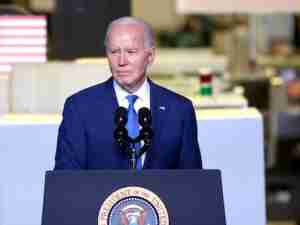President Joe Biden said he would consider personally sanctioning Vladimir Putin if he orders an invasion of Ukraine, escalating the U.S. effort to deter the Russian leader from war.
“Yes,” Biden said Tuesday in Washington, in answer to a reporter’s question about whether he could see Putin facing U.S. sanctions. “I would see that.”
The U.S. rarely levels sanctions directly against heads of state. But Biden has threatened some of the most severe economic penalties the U.S. and its allies can muster if Putin orders more than 100,000 troops massed outside Ukraine to cross the country’s border.
The Kremlin has denied any plans to invade but has demanded concessions from NATO, including a guarantee the alliance won’t add Ukraine as a member or otherwise expand and a rollback of forces from former Soviet states.
As the U.S. and NATO allies hold talks with Russia, Biden’s administration continues to brace for any potential invasion. That has included threatening devastating sanctions on Russia, sending weapons, ammunition and other equipment to Ukraine and preparing to dispatch 8,500 troops to NATO countries in Eastern Europe. Biden has ruled out U.S. or NATO troops entering Ukraine itself.
The scope of potential sanctions remains unclear. European Union members aren’t in agreement with the U.S. on how broadly to target the Russian economy. Germany, for example, has pushed for an exemption for the energy sector if there is a move to block Russian banks from clearing U.S. dollar transactions.
Biden himself has acknowledged that some allies may disagree on retaliation if Putin stops short of an invasion but orders other hostile acts, like cyber attacks or supporting militia groups.
“As I’ve said, there are going to be serious economic consequences if he moves,” Biden told reporters during a visit to a boutique in Washington. “If he were to move in with all those forces, it would be the largest invasion since World War II. It would change the world.”
The impact of any sanctions that could be imposed on Putin is unclear. The Russian leader’s assets are a mystery, perhaps only known in piecemeal by some Western intelligence agencies. More is believed to be known about Russian oligarchs and other people in Putin’s inner circle, and those individuals could be regarded as proxies for Putin.
In a series of leaked documents known as the Pandora Papers and reported by the Guardian last year, investigators sought to track the wealth of some people believed to be close to Putin. But pinning specific assets or bank accounts on the Russian leader has proved difficult.
Officially, Putin owns hardly any assets. His annual income is about 10 million rubles, and he owns three cars and an apartment, according to his latest financial disclosure.
The Kremlin has objected to the idea that the U.S. might impose financial penalties on Putin.
“Introducing sanctions against the head of the government or the head of Russia is an extreme measure which is comparable to a breakdown in relations,” Kremlin spokesman Dmitry Peskov told reporters in a briefing earlier this month.
And the Kremlin earlier warned that a U.S. move to put about 8,500 troops on alert for rapid deployment to Europe “exacerbates tensions” in the region. Biden told reporters that the troops may begin moving soon.
“I may be moving some of those troops in the nearer term, just because it takes time,” Biden said, adding it’s not “provocative” to do so. “If you notice, you don’t see a lot of concern in terms of their security, about any of our NATO allies in Western Europe, but in Eastern Europe, there’s reason for concern.”
He said it remains unclear whether the risk of an invasion is rising of falling.
“It’s a little bit like reading tea leaves,” he said. “Ordinarily, if it were a different leader, the fact that he continues to build forces along Ukraine’s border from Belarus to all the way around, you’d say, well, that means that he’s looking like he’s going to do something.”
“But then you look at what his past behavior is and what everyone is saying in his team, as well as everyone else, as to what is likely to happen,” Biden continued. “It all comes down to his decision.”
Biden has previously said he would seek to reinforce NATO’s eastern front in the event of a Ukraine invasion. He added that “we have no intention of putting American forces or NATO forces in Ukraine.”
Russian troops, he said, are “along the Russian border, Belarus border. So everyone from Poland on has reason to be concerned about what would happen and what spillover effects could occur.”








